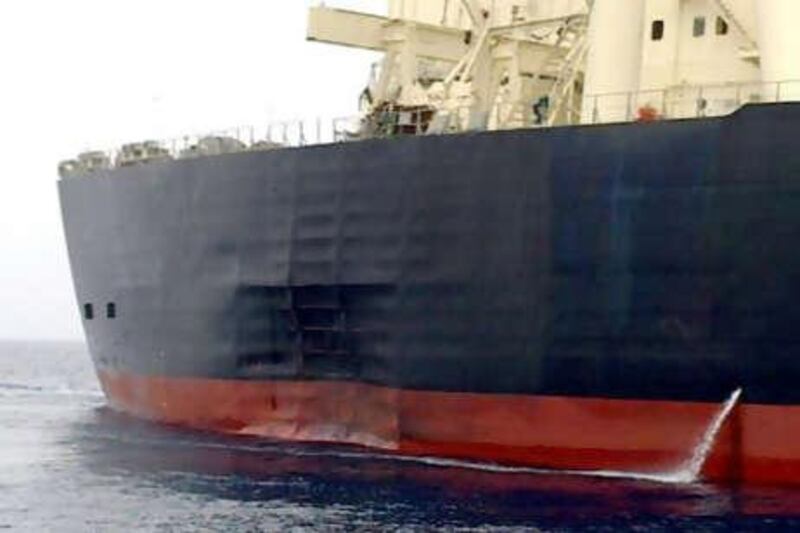ABU DHABI // Investigators were combing a Japanese oil tanker docked in Fujairah last night after it was damaged by what its owners claimed was an explosion. The M. Star was travelling from Al Ruwais to Japan when the blast occurred in the Strait of Hormuz early yesterday. The cause is unknown but the ship's operator, Mitsui OSK Lines, and the Japanese transport ministry said it was "highly likely" to have been an outside attack. However, Emirati and Omani officials attributed the damage to a freak wave.
According to the US Navy's Bahrain-based Fifth Fleet, the explosion hit the starboard side of the Marshall Islands-flagged vessel at about 4.30am yesterday. A lifeboat was blown off the ship in the blast and hatches were damaged. Kazumi Makamura, a spokeswoman for Mitsui OSK, said the galley windows were damaged and "the bridge wing door was buckled ... there is other damage we are checking. We do not know when the investigation will be completed".
She confirmed one of the ship's 31 crew members suffered minor injuries. As for the cause of the blast, "There is nothing that can explode in that part of the vessel," a different company spokeswoman, Eiko Mizuno, told The Associated Press. A crew member saw a flash of light before the explosion, indicating a possible external attack, she said. The ship, which was loaded with 270,000 tonnes of oil, arrived in Fujairah about 5pm yesterday, and investigators boarded the tanker to assess the damage. No oil was spilled in the incident, officials said. A port source said the company's Britain-based insurance carrier was sending a surveyor and a weapons expert to examine the ship. The UAE's state news agency, WAM, cited a UAE official as saying there was no possibility the damage was caused by an attack, adding that no trace of explosives was found on its outer body structure. It said a large wave that resulted from a "seismic shock" was responsible.
There was no unusual seismic activity in the region, according to a spokesman for the National Centre of Meteorology and Seismology. The Omani transport ministry also attributed the damage to a large wave. "There's no reason to suspect foul play," a spokesman for the ministry said. "Our information from the Omani coast guard officers, who have been at the vessel, said that it was a strong wave that caused the damage. It has already docked in Fujairah for inspection." Dr Mustafa Alani, the senior adviser for security and terrorism at the Dubai-based Gulf Research Centre, said initial investigation will focus on the nature of the damage to the ship. "It's very easy to tell if it's an external attack or not from whether the damage is pushing inside or internal," Dr Alani said.
He said there were three possibilities for an attack: piracy, a state-sponsored attack or terrorism, the first two of which he discounted. "If this was piracy, it would have been followed by an attempt to hijack the ship and there are no reports of an attempt to board." Pirates are unlikely to travel into the highly patrolled Strait of Hormuz, where the US and other international navies are active, Dr Alani added. Monsoons in the Gulf of Aden also make the seas too rough for pirate skiffs at this time of year. About 40 per cent of the world's oil passes through the Strait of Hormuz, one of the world's most important waterways. Riad Kahwaji, the chief executive of the Dubai-based Institute for Near East and Gulf Military Analysis, said it is difficult to draw conclusions until a full investigation has been done but discounted the theory that a wave could have been responsible in the relatively sheltered waters. Built in 2008, the M. Star is a double-hulled tanker. Single-hulled vessels have been gradually phased out since the Exxon Valdez accident in 1989 that resulted in one of history's most devastating oil spills. * With additional reporting by Eugene Harnan, Anna Zacharias and Saleh al Shaibany






